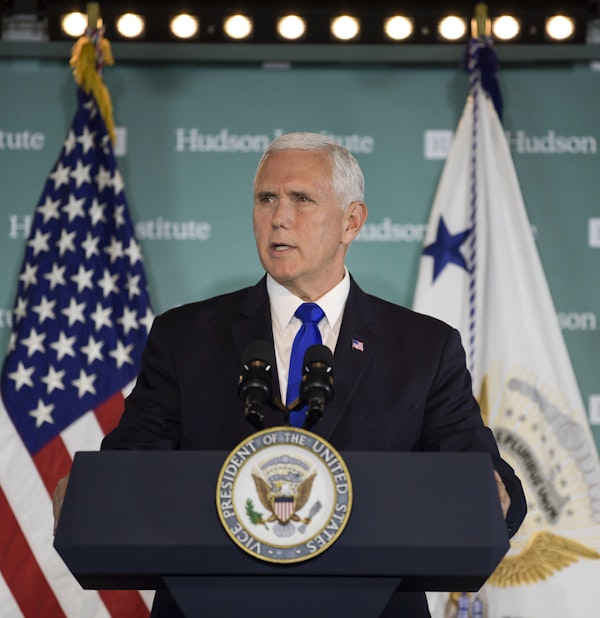America’s Values Will Help Win a New Cold War
Riding on the strength of its capacity to innovate technologically, China’s economy could overtake the United States’ economy within the next 10 years. But America’s rule of law gives the U.S. a powerful card in the deck.
 Niall Ferguson on stage at Engage at the Bush Center, presented by Highland Capital Management, in June 2019. (Grant Miller / George W. Bush Presidential Center)
Niall Ferguson on stage at Engage at the Bush Center, presented by Highland Capital Management, in June 2019. (Grant Miller / George W. Bush Presidential Center)
Niall Ferguson is a senior fellow at the Hoover Institution at Stanford University and at the Center for European Studies at Harvard University, where he taught history for 12 years. The author of 14 books, Ferguson is also an accomplished filmmaker, including winning an International Emmy for Best Documentary for his PBS series, The Ascent of Money.
Before appearing at a recent Engage at the Bush Center, presented by Highland Capital Management event, Ferguson spoke with Catalyst Editor William McKenzie about what he considers an emerging Cold War with China. This Cold War may be more difficult, he says, but the U.S. can prevail by appealing to the Chinese people, many of whom appreciate our democratic capitalism. Our values will help the U.S prevail.
You wrote recently that we have moved from a trade war to a tech war to a new Cold War. So what makes you think we are in a new Cold War? And with whom?
If you look at the way the Cold War began, there are certain resemblances. Some are rhetorical. When Vice President [Mike] Pence gave his speech at the Hudson Institute in October, it sounded a lot like the early Cold War in its implied containment strategy and its analysis of China’s ambitions. It wasn’t a mile away from the way in which George Kennan framed the problem of the Cold War in his famous anonymous article in 1947.
There’s also a simple historical analogy here. The Chinese Communist Party has essentially stepped into the role played by the Soviet Union through the Cold War. It’s engaged in a technological competition with us based on stolen technology. That’s exactly what the Soviet Union did. They didn’t invent the atomic bomb. They stole it, copied it.
So, there’s competition in technology, but also in space, and in what we used to call the Third World. It may not be obvious to the lay observer, but in some ways we are already in Cold War II, and it has the potential to escalate. There are a whole bunch of different areas in which the U.S. and China can clash, including old-fashioned geopolitical theaters like the South China Sea, North Korea, and Taiwan. These are Cold War flash points. And let’s not forget that China and the United States fought a hot war in Korea during the Cold War. So I do sense that we have gone quite a long way down this road.
 Vice President Mike Pence speaks on China at the Hudson Institute in October 2018. (White House)
Vice President Mike Pence speaks on China at the Hudson Institute in October 2018. (White House)
Of course, it’s not the same exactly. We are far more intimately bound up with China economically and even culturally than we were with the Soviet Union. We are doing a Cold War with a massive trading partner. We are doing the Cold War with an economy that was once so close to us that I used the phrase “Chimerica” to describe it. We are doing a Cold War when we have up to 400,000 Chinese students in American colleges. How many Soviet students were here in 1949? Single digits, I’d guess.
In some ways we are already in Cold War II, and it has the potential to escalate. There are a whole bunch of different areas in which the U.S. and China can clash.
If we are in a new Cold War, how do we prevail? In one of your pieces, you wrote that there was no guarantee that we were going to win the first one.
The Cold War’s outcome was not predestined and at a number of junctures it really didn’t look at all good for the United States. It might not have turned out well last time. But the Soviet Union was a weak adversary compared with China. It was economically much inferior.
China could conceivably overtake the U.S. economy in the next 10 years in current dollar GDP, so it is a clearly bigger economic challenge. China’s capacity to innovate technologically, say in artificial intelligence, is dauntingly large.
The Soviets never really had that capacity. Rarely did they innovate. You see that China has unleashed its private sector in a way that the Soviets never did. They have a lot more potential to innovate and are less constrained when it comes to things like data privacy.
I think this is a tougher war for us to win.
The Cold War’s outcome was not predestined and at a number of junctures it really didn’t look at all good for the United States. It might not have turned out well last time. But the Soviet Union was a weak adversary compared with China.
How would we prevail?
It was crucial in the Cold War that we had a network of extraordinarily effective alliances. If we go full Cold War now and expect the same allies to show up unequivocally on our side, we may be rudely awakened when a lot of them say they will be nonaligned this time.

For example, there might be great ambivalence in Europe about all of this. You might find that the U.S. can call on the “Five Eyes” countries (Great Britain, Canada, Australia, New Zealand, and the United States), and that’s it. If we are going to prevail, we should not just take out the playbook of the late 1940s or any period in the Cold War and attempt to use it. I don’t think it will work.
The best playbook would be quite different. Don’t engage in nuclear brinkmanship and avoid proxy wars. What we can do that is different is appeal to the Chinese people inside and outside the People’s Republic of China. There is a very large Chinese diaspora, including inside the United States, something like 2.3 million Chinese residents. Half of them have citizenship. They are the Chimericans.
We have to appeal to them by emphasizing the fundamental superiority of a free society over an unfree one. Many middle-class Chinese are deeply skeptical about Xi Jinping’s approach. They are quite attracted to the United States. If they could send all their kids and money here, they probably would.
Many middle-class Chinese are deeply skeptical about Xi Jinping’s approach. They are quite attracted to the United States. If they could send all their kids and money here, they probably would.
The most powerful cards in the U.S. deck are our values: individual freedom, religious tolerance, freedom from an intrusive surveillance state, and, above all, the rule of law. I don’t think we necessarily need to pound democracy as hard as we sometimes do because rule of law is a much more powerful card to play.
The Chinese know that, if they’ve made any money at all. There’s a very large middle class now. But they don’t have secure property rights. That’s why they would love to get their money out and come here. We have the rule of law. That’s where we have strength.
 A densely populated neighborhood in Chongqing, China. (Shutterstock)
A densely populated neighborhood in Chongqing, China. (Shutterstock)
I don’t believe that the Xi Jinping model of a totalitarian 2.0 with artificial intelligence is going to work. It’s quite a weak model. All we need to do is compete by offering a far more attractive vision of a free society. That’s how we win this.
I don’t believe that the Xi Jinping model of a totalitarian 2.0 with artificial intelligence is going to work. It’s quite a weak model. All we need to do is compete by offering a far more attractive vision of a free society.
Let me broaden the scope a bit. How do we do that in places like Hungary, where so-called illiberal democracies have taken root? How do we make those arguments beyond China?
Part of what we have to do is watch carefully how the illiberal democracies are being penetrated by the Russians and Chinese. We need to expose at every turn the influence operations and the information wars that Moscow and Beijing in tandem are pursuing. The so-called illiberal democrats and populists have a suspicious amount of support from those quarters.
I don’t have as negative a view of [Hungarian Prime Minister] Viktor Orban as some. We sometimes get a caricature version of Orban in, say, The New York Times. There are good reasons the populist right is doing well in Central and Eastern Europe. Those places have a different political culture from Western Europe and the immigration issue has pushed the electorate quite significantly to the right.
I don’t think we should dismiss out of hand what is going on in Budapest or in Warsaw. But I do think we should look pretty carefully at what the Chinese are doing financially in Eastern Europe and what the Russians are doing in terms of information warfare. That does seem a threat.
 Hungarian Prime Minister Viktor Orban in Brussels, Belgium, March 20, 2019. (Alexandros Michailidis / Shutterstock)
Hungarian Prime Minister Viktor Orban in Brussels, Belgium, March 20, 2019. (Alexandros Michailidis / Shutterstock)
About immigration, you wrote last year, “Increasingly, I believe that the issue of migration will be seen by future historians as the fatal solvent of the EU. In their accounts, Brexit will appear as merely an early symptom of the crisis.” Why do you think that?
I don’t think Brexit would’ve happened — the referendum would have gone the other way — had it not been for the great surge of migration into Europe in 2015 and 2016. That had a major impact on the way that British, especially English and Welsh, voters thought about the EU. I know because I was campaigning on the other side for Remain. In the pubs of middle England, immigration was what people wanted to talk about.
We would go in there with talking points about the economy, and people wanted to talk about immigration. They always asked, “What about those 1.3 million people the Germans have just let in from mainly Muslim countries? If they get German passports, could they come here?” The only answer was, “Er, yeah.”
I don’t think Brexit would’ve happened — the referendum would have gone the other way — had it not been for the great surge of migration into Europe in 2015 and 2016.
The Europeans are no nearer having a coherent collective response to the challenge of mass migration across the Mediterranean and the Adriatic. If European integration has anything to offer, it is on every other issue but that, which is the dominant issue. You begin to ask what the point of the European Union is if it can’t actually address immigration.
The third point is that the potential mass migration from Africa and the Near East is so much larger than the likely migration towards the United States from Central America. If even moderately pessimistic scenarios about Africa are right over the next 10 to 20 years, you haven’t seen nothing yet.
That’s the fundamental problem for Europe, but they sit in Brussels debating banking union, monetary policy, or defense cooperation. They have no answer. All of this is a side show if there is no secure border.
 A pro-Brexit march in London, England, March 19, 2019. (Paul G. E. Smyth / Shutterstock)
A pro-Brexit march in London, England, March 19, 2019. (Paul G. E. Smyth / Shutterstock)
So what should European countries be doing about immigration?
In Europe, the border is extremely hard to secure. There are three different routes into Europe and if you try to shut down one it just shifts the traffic to the others. And the incentives are very attractive. If you can get in, the treatment of asylum seekers is really quite generous in most European countries. I know because I’m married to a former asylum seeker who was giving an extremely good new start in life when she arrived in the Netherlands back in the 1990s.
The Europeans have a much, much bigger problem and they are going to deal with it one nation at a time. That’s why I say it’s the fatal solvent. One nation at a time realizes there is no European solution to this problem, so we will have to do our own border. The Danes are doing this, reimposing their land border. Europe’s passport-free Schengen area will soon be gone.
There is a lot to worry about in the world, but what gives you hope?
In some ways, there is less to worry about than there used to be. I’m constantly reminded of this when I think about the late 1960s and early ‘70s. That was quite a scary time domestically and abroad.
We all have to remember that the threats we face or worry about are substantially less immediate and catastrophic than a thermal nuclear war would have been between the United States and the Soviet Union. We are prone to exaggerate the scale of certain threats.
In some ways, there is less to worry about than there used to be. I’m constantly reminded of this when I think about the late 1960s and early ‘70s. … We all have to remember that the threats we face or worry about are substantially less immediate and catastrophic than a thermal nuclear war would have been between the United States and the Soviet Union.
For example, we are edging towards a millenarian mania on climate change, with young people proclaiming that the end is nine to 12 years away. This kind of climate alarmism is the mirror image of denial, and probably helps the deniers because it’s so overblown. The climate change scenarios will happen to some extent and what we should really be thinking about is how will we cope and what the balance of disaster will be.
The Catalyst believes that ideas matter. We aim to stimulate debate on the most important issues of the day, featuring a range of arguments that are constructive, high-minded, and share our core values of freedom, opportunity, accountability, and compassion. To that end, we seek out ideas that may challenge us, and the authors’ views presented here are their own; The Catalyst does not endorse any particular policy, politician, or party.
-
Previous Article Hacking, Privacy, and Democratic Freedoms in the Information Age An Interview with Michael Chertoff, Former Secretary of Homeland Security
-
Next Article A Growing Africa Deserves a Central Place in U.S. Foreign Policy An Essay by Holly Kuzmich, Executive Director of the George W. Bush Institute

